Samuel Whittington sells gemstones and hand-crafted jewelry on Wall Street, outside The Market Place restaurant. “This is my retail aspect,” he says; he also sells wholesale out of his studio and runs an Etsy site during the offseason.
After years of honing his craft, Whittington decided to bring his wares to the street in 2012. Most local vendors sit out the winter months, but some are taking advantage of the warm weather to keep going longer. “You can usually gauge business by driving around town and seeing how many people are walking around,” says Whittington.
Vendors, he maintains, help bolster the city’s charm. “I think the artists and local craftspeople are what give Asheville its flavor. That magnetism ripples out into the community in a beneficial economic way for the bars, theaters and restaurants — all the things Asheville thrives off of.”
In downtown Asheville, 30 permitted pushcarts offer a wide range of food, beverages and merchandise, helping foster a friendly, festive atmosphere within the central business district.
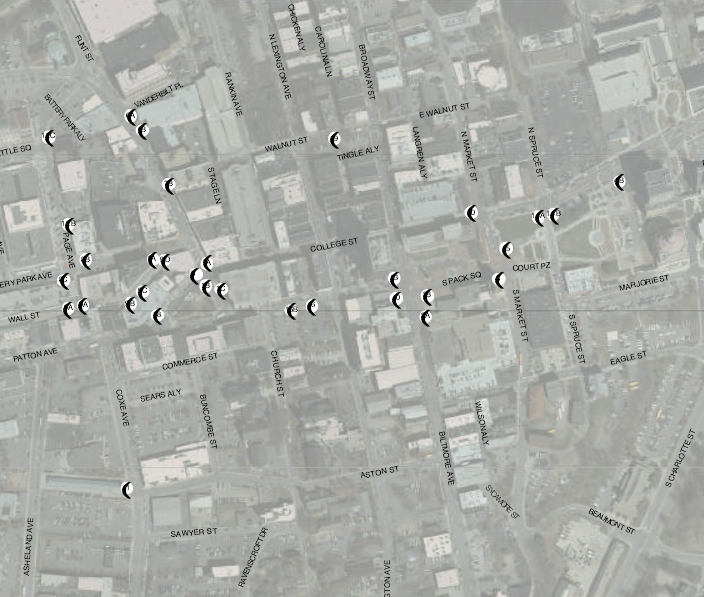
X marks the spot
Asheville first allowed pushcarts on its streets in the late 1980s, allocating a limited number of places in 20 different specified areas as part of the the Downtown Development Office efforts to revitalize the Central Business District. Places like Pritchard Park, Pack Square and Wall Street, which often draw heavy pedestrian traffic during tourist season, include multiple pushcart sites. Battery Park Avenue, Haywood Street and Page Avenue also feature pushcarts.
“Each cart has a designated spot, which people can apply for and are assigned to for a year,” says Ricky Hurley, development review specialist with the city’s Permits & Applications Division.
Current permit holders are given preference when it’s time to renew; open sites are then available on a first-come, first-served basis, says Hurley. Permits run from April 1 to March 31, he explains. “It’s more of a convenience factor: That way, they have the whole summer season and fair weather time of year to conduct their business.”
First-time applicants, says Hurley, can expect to pay about $364: “$150 for the initial application fee, $200 for the non-encroachment agreement, and then all permits are subject to a 4 percent technology fee, which comes out to about $14.” Vendors must also buy liability insurance in amounts ranging from $25,000 (for merchandise carts) to $1 million (for those serving food).
Renewals cost $104 per year; permit holders have until the end of the business day on March 31 to renew. But those wishing to move to a new location have to wait until April 1 to see what’s available.
All carts need to pass a city inspection to make sure they meet the permit requirements. They must be between 28 and 54 inches tall and from 6 to 24 square feet. Umbrellas or other overhead coverings must be 5 feet above the surface, and the wheels must be at least 6 inches in diameter to prevent tipping.
Many vendors, especially those selling merchandise, build their own carts. “It’s hard to find a pre-made cart out there,” Hurley reports. “It’s a very specialized product and can be expensive.” Motorized carts are prohibited unless the vendor has an Americans with Disabilities Act exemption.
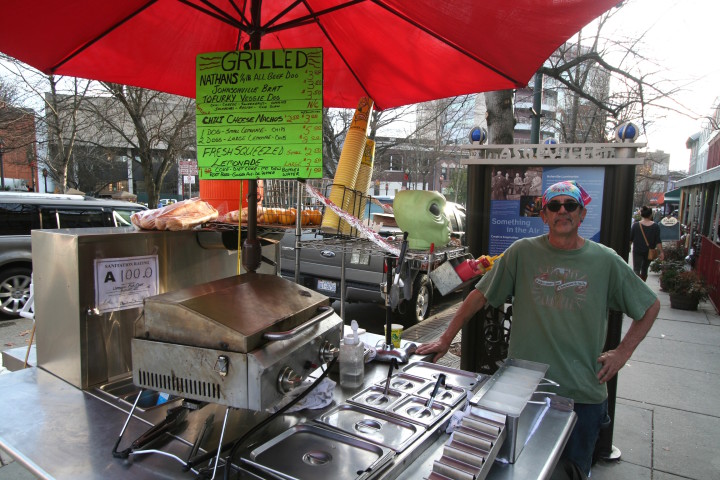
A downtown fixture
For nearly nine years, Stan Nikolski has peddled hot dogs, brats, Tofurky and nachos to hungry passers-by at the corner of College and Haywood streets.
“I think I know almost everyone who works downtown,” he jokes as he bustles around, preparing a dog for a customer. “I’ll have people call me around lunch, asking if I’m going to be out here today. I’ve watched my customers’ kids grow up before my eyes.”
Nikolski got his start in the business almost by chance: After moving from New York with his wife, he spotted an ad for a hot dog cart in Mountain Xpress. Having sold hot dogs as a teenager, he jumped at the opportunity. And though friends had reservations about both the business and his location, Nikolski says the cart has been a great investment.
“People get nervous because of the homeless people who hang out in the park, but I don’t mind them at all,” he says. “Honestly, they’re some of my best customers.”
Nikolski attributes his longevity to a couple of key factors. “I’m one of the only food vendors in town with reasonable prices,” he proclaims proudly. Rather than catering to tourists, he’s developed a loyal, steady clientele.
Pushcarts, Nikolski maintains, offer several advantages over brick-and-mortar establishments. “I have a 100 rating from the Health Department,” he says, pointing to the certificate from his last inspection. Part of the reason, he explains, is that a cart requires less maintenance — and thus has less chance of being in violation. “I don’t have to worry about pests. I’m not going to get marked down because my thermometer is too far away from my stovetop.”
Ultimately, though, it boils down to being visible and building lasting relationships. “You’ve got to be out here consistently,” he says. “Customers have to know you and know where you’re going to be on any given day.”
Making the grade
Like conventional restaurants and food trucks, food carts must comply with the state health code, notes Jessica Silver, environmental health director for the Buncombe County Health & Human Services Department. Four food carts are currently subject to twice-yearly inspections, says Silver. Those serving prepackaged, previously inspected food items are exempt.
Under North Carolina law, operators have to store their cart in “an area that protects it from dirt, debris, vermin and other contamination,” and food must be offered in clean, single-service containers. Utensils, too, must be protected from contamination, and paper napkins must be provided.
Since 2012, the county Health Department has given each pushcart a sanitation score and a letter stating that the business meets health requirements, which is then presented to the city’s permitting office. “We require them to provide the state Department of Ag or the county Health Department with a letter saying ‘Here’s my rate’ [for insurance] or ‘I’m exempt completely,’” Hurley explains. “If they’re selling a prepackaged Little Debbie cookie or a bottle of water, you may not need Health Department approval at all, because it’s all manufactured somewhere else,” he notes.

Farm to curb
Walter Harrill peddles jams made from the blueberries grown on his Fairview farm, Imladris.
Farming is a family tradition stretching back to Harrill’s great-grandparents. Harrill himself has been making jams for 15 years using blueberries grown on his land. The pushcart business, he explains, is a way to attract a wider clientele while adding value to his crops. “I can get $1 for a carton of fresh blueberries, versus $3 for a jar of jam, and it lasts longer.”
Harrill originally set up shop near the Grove Arcade but moved to his current spot in front of the Early Girl Eatery several years ago. “Early Girl sells and serves my jams in their restaurant,” he notes. “So it’s a natural mix to be out here.”
Working from a pushcart, says Harrill, offers greater freedom in terms of scheduling. During the warmer months, he typically puts in one day each weekend whenever his farm obligations let him get away. “I’m a farmer full time,” he says. “It’s nice to be out here making money, but if business is slow, I can go back to the farm and do some work there without worrying about rent or utility bills.”
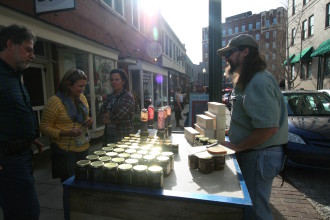
The cart also enables him to interact directly with customers. “It’s a good way to try out new products and make acquaintances,” Harrill explains. “Folks are usually waiting out here to eat in the mornings: They’re hungry, and I’m entertaining and have foodstuffs.”
The location, he notes, plays a pivotal role in his cart’s success. “My business is tied in with Early Girl. If you moved me 300 feet down the street, I’ve lost 50 percent of my business.”
And while others might see a pushcart as a steppingstone to a fixed facility, for Harrill, “This is my permanent solution.”
Taking it to the streets
Although certain locations are much in demand, Hurley says 2015 is the first time he’s seen every available space claimed. “It seems to run in an ebb-and-flow cycle,” he reports. “There will be several years where everybody will hold onto their spaces, and then there’ll be this great shuffle,” often because vendors leave the area or move to a permanent site.
And while most pushcarts are self-contained businesses, others serve as a second location for an existing downtown store.
Timothy Sadler works for Spiritex, selling their clothes from a Pack Square pushcart. “T-shirts are a great item for a cart,” he says. “All of our shirts are manufactured here in the Carolinas, with a focus on using organic cotton.” The cart helps ensure maximum contact with consumers in two of downtown’s more highly trafficked areas.
Sadler sees pushcarts as a great way to support small, independent businesses in a city where real estate costs can be prohibitive for startups; he hopes the city will consider expanding the program. “I have a handful of friends who’d like to explore street vending, but we need more usable space,” says Sadler.
One possibility is closing certain downtown streets to motor vehicles on specified days and letting street vendors gather along those corridors. “It’s a great way for the city to grow its tax base and economy without having to build more,” he asserts.
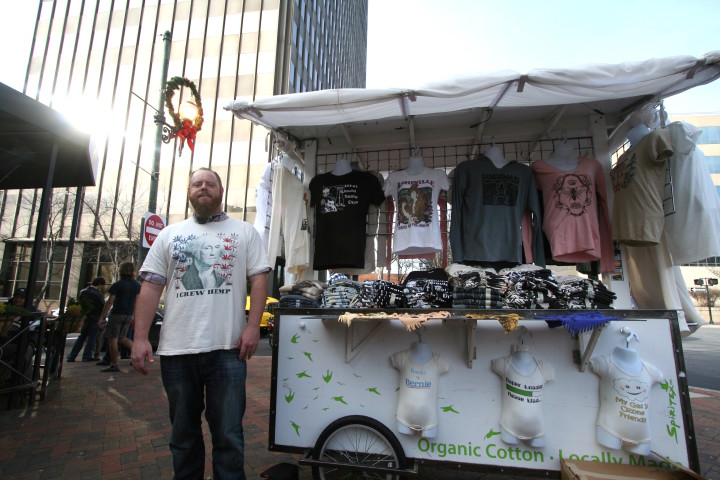
That’s not out of the question, says Hurley, but it would require extensive planning involving the Public Works and Transportation departments as well as downtown merchants. “It would be a very involved discussion process, from the city’s end.”
Sadler concedes that closing a street is “not a simple thing,” but he believes strategic, cooperative planning could get the job done. Many Wall Street businesses, he reports, support the idea. “Other cities have figured out how to do this. It’d be wonderful if we could collectively figure out something like that.”
Goodwill ambassadors
Mamadou Gaye, who operates the Timbuktu Crafts cart on Haywood Street, has sold handmade jewelry, crafts and apparel for two years now. “It’s something I like to do,” he explains. “My family in Senegal sends me the products, which they make themselves.”
From Friday to Sunday, you can find Gaye and his cart in his spot year-round, weather permitting. And though he says he’s satisfied with his situation, Gaye favors allowing pushcarts more freedom to move around town. “It’d be nice, as long as they follow the rules,” he maintains. “If folks aren’t using a particular spot, others who hold a permit should be able to use it for the day.”
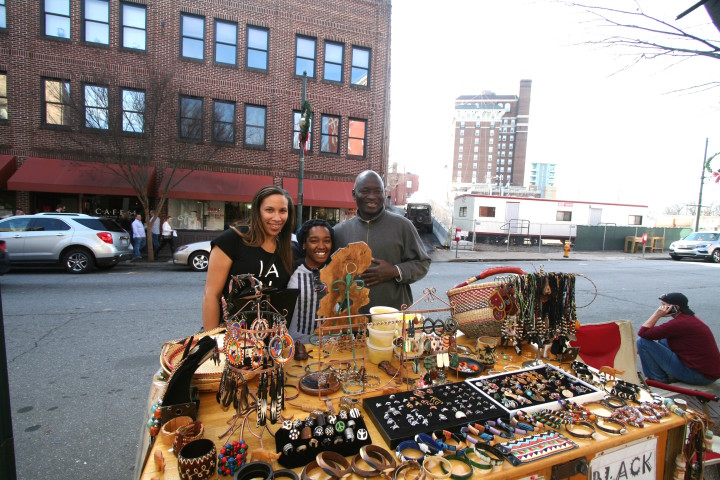
But the complex logistics of the cityscape, notes Hurley, often limit where pushcarts can go. “We have to leave at least 6 feet of clear zone for pedestrian passage. When you think of all the obstructions — a mailbox, a tree, a door swinging out, fire hydrants, bike racks — if a cart creates a pinch point, we can’t do it.”
Gaye sees himself as “an ambassador for Asheville. I greet visitors to the city, help tourists find their way, and give directions when they’re lost. I help introduce them to the culture of the city.”
In addition, notes Hurley, pushcart vendors provide another layer of protection for visitors and locals alike. “If it’s a crime-ridden area, vendors don’t want to be there, because it’ll drive away their customers,” he points out. “So the carts have a vested interest in keeping their eyes open for personal safety, product safety and their customers.”
Echoing many vendors, Hurley sees pushcarts as a key component of the city’s distinctive ambiance. “If you go around anywhere else in the state, there’s very little in the way of that. In Asheville, we have a number that sell a variety of products. It’s something that’s unique: It’s another focal point of street life.”
Whittington agrees, saying, “I feel like it offers exciting things for the tourists to explore. It gives this city an extra edge: It adds a lot of color.”



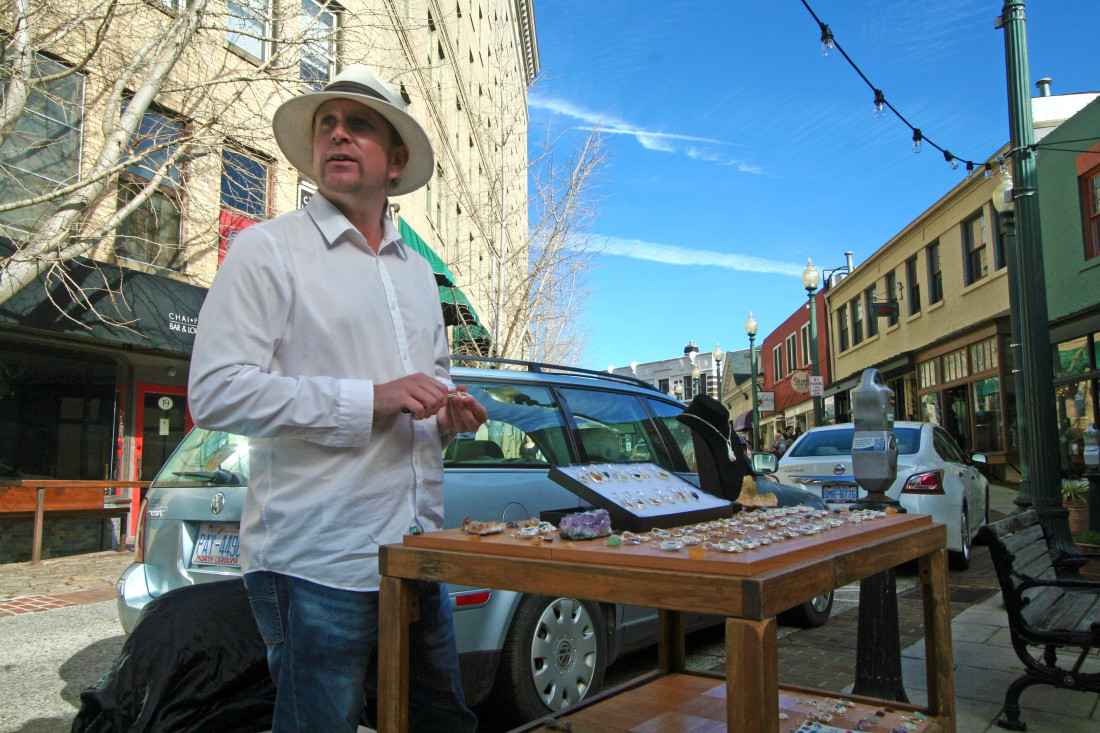
Before you comment
The comments section is here to provide a platform for civil dialogue on the issues we face together as a local community. Xpress is committed to offering this platform for all voices, but when the tone of the discussion gets nasty or strays off topic, we believe many people choose not to participate. Xpress editors are determined to moderate comments to ensure a constructive interchange is maintained. All comments judged not to be in keeping with the spirit of civil discourse will be removed and repeat violators will be banned. See here for our terms of service. Thank you for being part of this effort to promote respectful discussion.